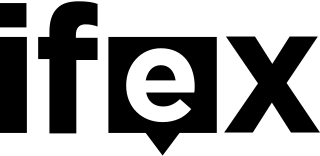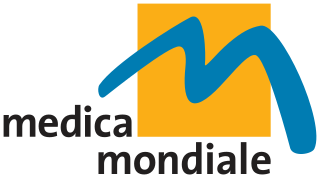
IFEX, formerly International Freedom of Expression Exchange, is a global network of more than 119 independent non-governmental organisations that work at a local, national, regional, or international level to defend and promote freedom of expression as a human right.

The World Association of Community Radio Broadcasters is the international umbrella organization of community radio broadcasters founded in 1983, with nearly 3,000 members in 110 countries. Its mission is to support and contribute to the development of community and participatory radio along the principles of solidarity and international cooperation.

The International Federation of Journalists (IFJ) is the largest global union federation of journalists' trade unions in the world. It represents more than 600,000 media workers from 187 organisations in 146 countries.

War Child International is an independent non-government organization founded in 1993 by film-makers Bill Leeson, David Wilson, and peace activist Willemijn Verloop. The organization works with parents, caregivers, community members, NGOs, governments, corporations, and other partners worldwide to ensure that children have access to protection, education and psychosocial support. War Child's work is rooted in the United Nations Convention on the Rights of the Child.
Danish Committee for Aid to Afghan Refugees (DACAAR)(Danish: Den danske komité for hjælp til afghanske flygtninge) is a non-political, non-governmental, non-profit humanitarian and development organization working to improve the lives of the Afghan people since 1984.

Article 19 is a British international human rights organisation that works to defend and promote freedom of expression and freedom of information worldwide. It was founded in 1987. The organisation takes its name from Article 19 of the Universal Declaration of Human Rights, which states:
Everyone has the right to freedom of opinion and expression; the right includes freedom to hold opinions without interference and to seek, receive and impart information and ideas through any media regardless of frontiers.
The Commonwealth Press Union (CPU), formerly the Empire Press Union, was an association composed of 750 members in 49 countries, including newspaper groups, individual newspapers, and news agencies throughout the Commonwealth of Nations. They were represented within the CPU by their proprietors, publishers or senior executives.

Medair is an international non-governmental organisation (INGO) whose purpose is to relieve human suffering in some of the world's most remote and devastated places. Medair aims to assist people affected by natural disasters and conflict to recover with dignity through the delivery of quality humanitarian aid.
ZaMirNET (ForPeaceNET) is a Croatia-based non-governmental organisation working in the field of ICT.

People in Need (PIN) is a Czech nonprofit, non-governmental organisation based in Prague, Czech Republic. PIN implements humanitarian relief and long term development projects, educational programmes, and human rights programmes in crisis affected regions internationally. Its director is Šimon Pánek. As of 2022, PIN operates in 33+ countries.
Mass media in Pakistan provides information on television, radio, cinema, newspapers, and magazines in Pakistan. Pakistan has a vibrant media landscape; among the most dynamic in South Asia and world. Majority of media in Pakistan is privately owned. Pakistan has around 300 privately owned daily newspapers. According to the Pakistan Bureau of Statistics, they had a combined daily sale of 6.1 million copies in 2009. Television is the main source of news and information for people in Pakistan's towns, cities and large areas of the countryside. Marketing research company Gallup Pakistan, estimated there were 86 million TV viewers in Pakistan in 2009.
Media development involves capacity building for institutions or individuals related to freedom of expression, pluralism and diversity of media, as well as transparency of media ownership. Media development plays a role in democracy and effective democratic discourse through supporting free and independent media.
The Office for Conflict, Stabilisation and Mediation (OCSM), formerly the Stabilisation Unit, is a cross-government unit of the UK government, governed through the National Security Council. It is part of the Foreign, Commonwealth & Development Office (FCDO). It works cross-government to reduce the creation and intensity of conflicts abroad.
Concordis International is a non-profit organization that works alongside and in support of official peace processes. They exist to improve the potential for lasting peace. The organization has headquarters in London and country-offices in the Central African Republic and Nouakchott, Mauritania. Concordis' historical roots are in peace-building work by the Newick Park Initiative in South Africa (1986–1991) and in post-genocide Rwanda (1994–1997).
Internews Europe is an international development organisation founded in 1995 that specialises in media development which includes supporting independent media and free information flows in fragile states, emerging democracies and some of the world’s poorest countries. In doing so, it tries to promote good governance, human rights, effective response to humanitarian crises and access to information on critical issues such as the environment and climate change.
Solidarités International is a non-profit organization working in areas of conflict and natural disasters. Its main aim is to provide quick and effective support for people in life-threatening situations by meeting their vital needs: water, food and shelter. The organization also has a particular focus on unsafe drinking water and food insecurity among the most vulnerable populations. Solidarités International, an organization founded in 1980 by Alain Boinet under France's 1901 charity law, comprises 2 350 national and international employees. Each year it carries out over 120 humanitarian programs in 20 countries.

Saferworld is an international non-governmental organisation with conflict prevention and peacebuilding programmes in over 20 countries and territories in the Horn of Africa, the African Great Lakes region, Asia, the Middle East, Central Asia and the Caucasus. It was founded in Bristol, UK in 1989 and now has its main office in London.

Enab Baladi is a Syrian nonprofit media organization that publishes a newspaper with the same name, in Arabic and English. It was established in Darayya, Syria in 2011, and is also a 501(c)(3) nonprofit organization.
Foreign aid for gender equality in Jordan includes programs funded by governments or non-governmental organizations (NGOs) that aim to empower women, close gender based gaps in opportunity and experience, and promote equal access to education, economic empowerment, and political representation in the Hashemite Kingdom of Jordan.

Medica mondiale is a women's rights and aid organisation based in Cologne, Germany. It supports projects and advocates politically for girls and women affected by sexual violence in war zones worldwide.









